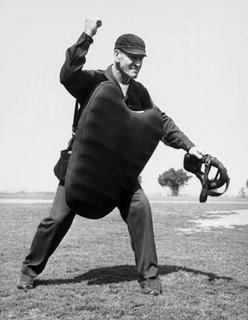So where were we? Oh yeah, the Regal Lodge in Oxnard.
There were a few more strange days in northern California after that. In Santa Cruz, I went to see Gillian Welch play at a gig at the Cocoanut Grove ballroom right by the boardwalk on Monterey Bay. You could feel vibrations from the roller coasters and hear screams from kids playing tag in the surf.
The promoter, for some reason, had decided that this should be a standing-room only show, expecting, I don’t know, some sort of Gillian Welch Appalachian mosh pit? Had he never heard her music, particularly the new album, The Harrow and the Harvest, the songs on which she describes as “10 kinds of sad”?
This is what led to the Great Santa Cruz Chair Heist of 2011, in which a thousand middle-aged folk and bluegrass aficionados, after standing out on the sidewalk for an hour and then trudging single-file up a long flight of steps, decided they would not, in fact, be standing for the show.
Next to the ballroom, often used for weddings and banquets, was an anteroom with stacks of chairs lined up against the windows. I don’t know who grabbed the first one, but that person is an American hero and should ha
ve a piece of furniture named after him/her. Before anyone could stop it from happening, the chairs were all taken into the ballroom, one by one, each person politely putting their stolen chair next to the one that had preceded them. Space was left in the middle for anyone who really did want to stand (the fools) and the chairs magically arranged themselves in a sightline-perfect semi-circle around the stage. It was great.
The promoter came out to announce the show, saw what had happened and, being an incredible dick, announced, “I didn’t realize we had so many disabled people in Santa Cruz.” He was booed. The show was great, though, all twangy and melancholy and not at all appropriate for dancing or standing. We left the chairs in the ballroom. There are rumors that the promoter was later found by the kettle corn stand, beaten to death by a mandolin.
I wandered north from there, lingered along coastlines and meandered through redwood forests. I had the best scones of my life in Mendocino County, and dared not ask about the ingredients. I may have been the only person in Arcata without dreadlocks and/or clothing made completely from hemp.
And then, for the first time since my infamous 1-day stint as the worst-employee-ever at the Portland Oregonian, I found myself back in Oregon, or, as I like to call it, “the rainy part of hell.”
We have a difficult history, Oregon and me. I’ve actually tried to live there twice. The first time, in 1977, I applied and was accepted at the University of Oregon’s master’s program in journalism. I didn’t really want a master’s degree but I did really want to live in the Pacific Northwest, because it seemed like a magical place where the weather was cool and the politics were cooler. I’d read a lot of Ken Kesey. And, of course, “The Electric Kool Aid Acid Test.” I wasn’t particularly drawn to California, for some reason, but Oregon and Washington seemed like the part of America where I wanted to be.
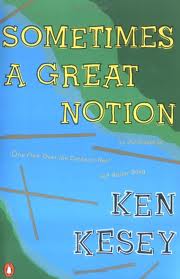 But they didn’t really want me. What I didn’t understand, at the time, was how cliquish the Pacific Northwest can be, how suspicious they are of outsiders, who they treat very nicely if they’re just passing through, but regard as a threat if they stick around too long.
But they didn’t really want me. What I didn’t understand, at the time, was how cliquish the Pacific Northwest can be, how suspicious they are of outsiders, who they treat very nicely if they’re just passing through, but regard as a threat if they stick around too long.
I’d applied for jobs at a slew of papers in and around Seattle and Portland – the Everett Herald, the Longview Daily News, the Tacoma News Tribune, the Eugene Register-Guard. It dawned on me, eventually, that the only way to break into tithe Pacific Northwest journalism world was to have some local references. So I applied to the University of Oregon and moved to Eugene.
I’d assumed – foolishly, it turns out – that I could get a part-time job in the sports department of the Register-Guard, make enough money to pay rent on a small apartment and maybe even dazzle them with my bullshit to the point where they’d offer me a real job and I could blow off the whole grad school thing.
But they wouldn’t even hire me part-time. I was genuinely shocked. I considered other jobs in Eugene – including working at an adult book store. But when told the duties would include cleaning out the “viewing booths” I decided to turn that down. Within a month, I’d given up on grad school plan and realized I’d have to get a newspaper job wherever I could, which turned out to be the complete other end of the country, at the Clearwater (Fla) Sun.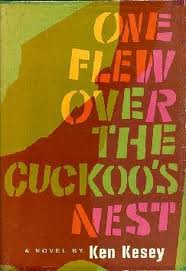
Strike One.
I tried again in 1994. An old Minnesota friend who’d spent many years traveling the world and winning Pulitzers, had become the new Associate Editor at the Oregonian, which had always been just a dreadful newspaper, ugly to look at and even uglier to read. But the corporate overlords had decided to re-invent the old gray beast and make it into a too-good-to-be-ignored west coast challenger to the Los Angeles Times. They wanted prizes, they wanted attention. They hired tons of new editors, reporters, graphic designers. And my friend, God bless her, decided they should also hire me.
What they needed, she said, was a writer who could shake the place up, not just with stories but as a presence in the too-staid newsroom. The Oregonian needed a jolt and my job, as I understood it, was to provide it. Which I did, within hours.
I leased a house in Portland and went up there a couple of months before the job was to officially begin, a chance to get familiar with the town before I started writing about it. In retrospect, I was also putting off, for as long as possible, the start of an actual report-to-a-boss and do-what-they-tell you job. I hadn’t been a staff writer since 1985. I didn’t realize it at the time, but I’d already gone feral. I was no longer fit for civilization.
That hadn’t mattered in the 70s and 80’s, when newsrooms were more freak shows than workplaces, clusters of malcontents and pathologically-skeptical misfits, many of them drunk, who had somehow managed to find a place where questioning authority was actually encouraged. Phones were thrown, as were tantrums. It was loud and raucous and way more like a frat house than it should have been. But there were characters — talented eccentrics — behind almost every desk. I was almost never the craziest person in the room. Not the sanest, certainly, but nowhere close to the craziest.
In the decade I’d been freelancing, and out of newspapers, that had all changed. Newsrooms had become as quiet and dull as insurance offices. Desks were kept clean. Shirttails were kept in. No one ever set anything on fire. It was a whole different world. I should have known this, and kind of did, but assumed these were all cosmetic things, that the nature of newsrooms and their inhabitants was still basically the same, that it was still a world of rabble-rousers and shit-stirrers. All they needed was someone to remind them of their true selves.
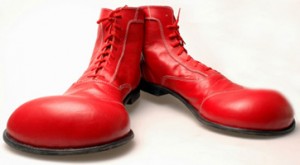 This is why I brought clown shoes to work. I did. I really did. It’s why, when the managing editor introduced me to the governor or Oregon, I made fun of his tie. It’s why I got all pissy about mandatory drug tests, even though I knew there were none in my system. Shake the place up, I was thinking, give them a jolt.
This is why I brought clown shoes to work. I did. I really did. It’s why, when the managing editor introduced me to the governor or Oregon, I made fun of his tie. It’s why I got all pissy about mandatory drug tests, even though I knew there were none in my system. Shake the place up, I was thinking, give them a jolt.
Because I’d objected to the drug tests, there were some problems processing my first-day paperwork, nothing serious, but enough that I couldn’t officially join the staff until after lunch. Until then, I’d been given a visitor pass, which said, prophetically, “Oregonian Visitor.. One Day Only.” While we were waiting for the Human Resources department to approve my documents, someone suggested I should teach myself the computer system, which was dramatically different than anything I remembered from the 80’s. So my friend, in what she must consider one of the worst decisions she ever made, logged me on to the system with her password, gave me an instruction manual and sat me at an empty desk.
Most of you know how this ends. The first section in the manual was “How To Write An E-Mail.” I followed all the instructions until I got to the point where there was a blank e-mail form on the screen. This is the point where a sane human being would write something along the lines of, “This is a test. I am testing the e-mail system.” That is not what I wrote.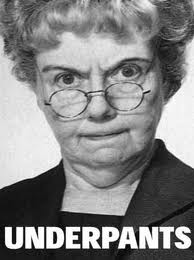
“Attention people of the Oregonian,” I typed. “In an effort to make everyone feel more comfortable, we have decided to designate Thursdays as “No Underwear Day” in the newsroom. All staff members will be subject to a brief inspection. Anyone found to be wearing undergarments will be severely reprimanded and forced to wear a sweater vest the following Monday.”
And then, the part that probably did me in: “Exceptions will be made for those staff members with hernias, testicular cancer or radical mastectomies.” Yeah, I know. Too specific. Too much. But it struck me as funny at the time.
I hit the SEND button, thinking that the note would go only to the few desks in my immediate vicinity, the other feature writers with whom I’d be working. Instead, it went to the whole building. Not just the newsroom. The whole building, from the mail room to the publisher’s office and everywhere in between. And, to make it worse, because I’d been using my friend’s log-on, it looked as if she’d sent it.
They fired me immediately. I was, yet again, genuinely shocked. I conceded that the memo probably wasn’t in the best of taste, but I’d sent it out by accident and it wasn’t really THAT bad and, Really? You’re Firing Me? Really?
Stuck with a lease I couldn’t break and not enough resources to move back to L.A., I stayed in Portland for 9 more miserable months. I made a couple of friends, but not many. I’d stayed too long. I didn’t fit in. Portland didn’t find me amusing. The feeling was mutual.
Strike Two.
But this visit with The Traipsemobile seemed to be turning out differently. People seemed friendlier than I’d remembered. There were microbreweries and wineries everywhere. In Jacksonville, a tiny town just north of Ashland, I saw The Avett Brothers at this amazing venue called The Britt Pavilion, a cedar-shingled outdoor stage surrounded by evergreens and soft green grass, the Rogue River running nearby, the Oregon Cascades visible in the distance..
In Ashland, parked downtown, a couple knocked on the Traipsemobile door, just to tell me how much they liked it. The woman, in her early 20’s, had already written a note to leave on the windshield in case I wasn’t there. “We think you’re cool,” it said. “We should hang out.” And then she wrote their phone number.
In Eugene I found my old apartment and walked all over the campus (where, by the way, much of “Animal House” was filmed.) And I had a wonderful time in Portland, re-connecting with friends I hadn’t seen in years, listening to music, drinking beer. I remembered why I’d loved the place so much at first – all that artistic energy, close to such much natural beauty – waterfalls, mountains, the Columbia River Gorge.
It seemed more forgiving than I’d remembered it. Less suspicious. Less uptight. I drove across the Columbia into Vancouver, Washington to use the Anytime Fitness gym there. There was a farmer’s market out front, pedestrians everywhere. I could watch them while I worked out.
Because of the farmer’s market, there wasn’t any street parking in front of the gym. But there was a parking lot around back, some of it clearly belonging to the condominium complex that shared the building with the gym. But there were other spots, not clearly marked, that seemed as if they might be for gym patrons. And, besides, no one ever bothers The Traipsemobile. It’s as if it has a magic invisibility shield.
Except in Portland. When I came out of the gym, The Traipsemobile was gone. I’m not sure what happened, but my guess is that someone in those condominiums was watching the parking lot, saw a vehicle they didn’t recognize, called the security guard and then, the tow truck. Maybe if I’d been there, I could have talked them out of it. Maybe not. It was Portland the way I remembered it, suspicious of outsiders, quick to invoke authority, unforgiving.
It cost me $350, plus cab fare, to retrieve The Traipsemobile from Chappelle’s Towing, out on Fruit Valley Road. The guys at the yard were nice about it, almost apologetic. But once the call came in, they said, they didn’t have a choice. And the fine was set by the state, not them. They helped scrape the VIOLATION sticker off my driver’s side window, acknowledged that the Traipsemobile had been a worthy adversary, almost too heavy for their truck to lift. But they couldn’t lower the fine or let me slide because, well, rules are rules. You don’t park in other people’s spaces in Portland. Or make jokes about underpants. You just don’t.



